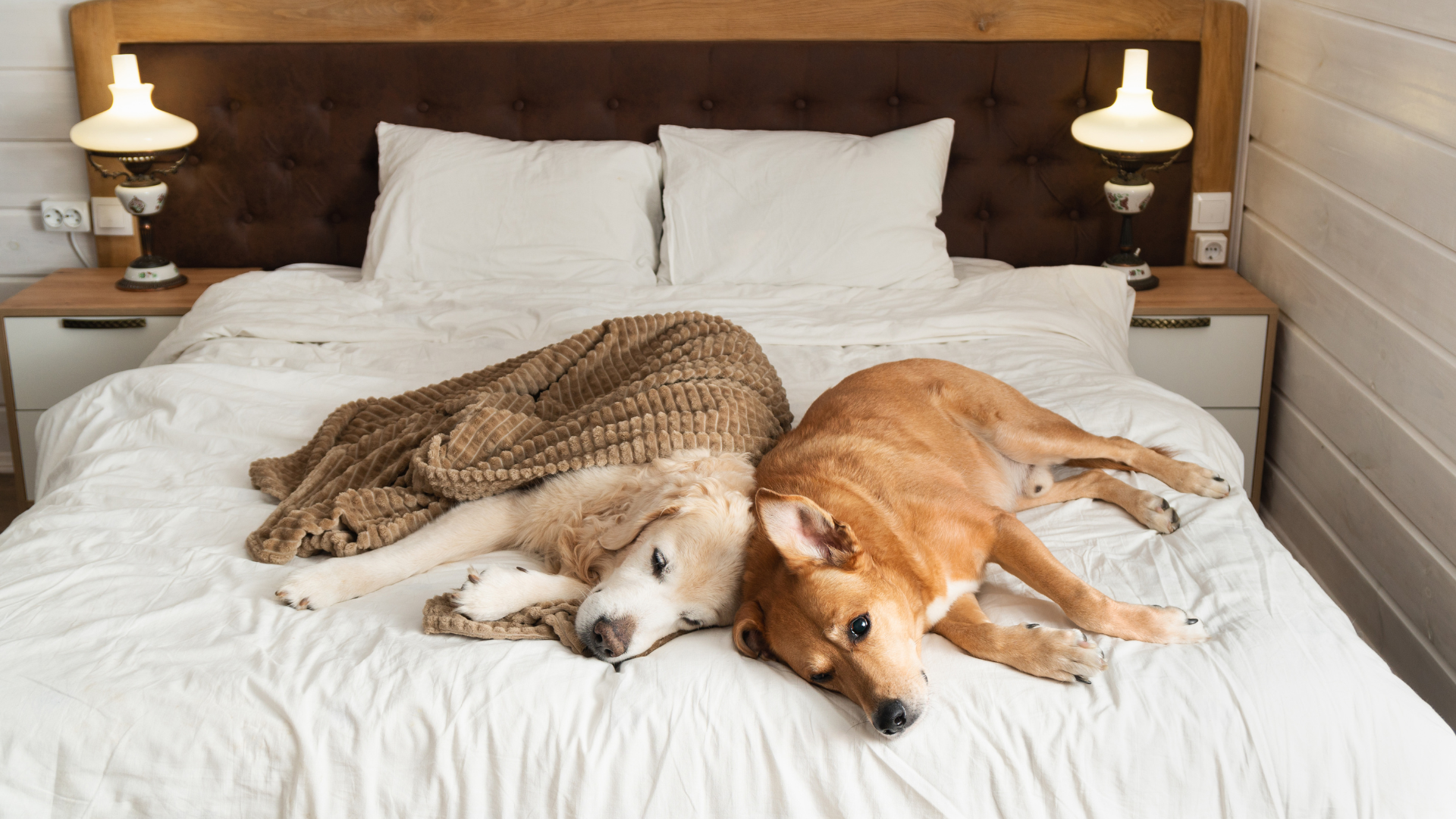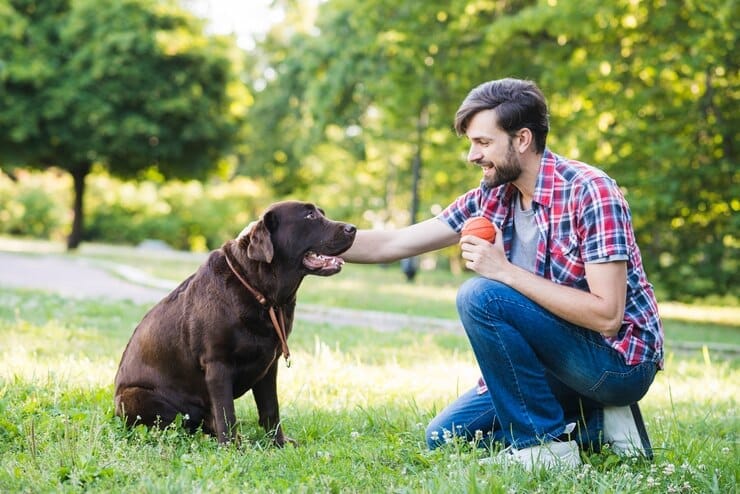Dogs are known for their loyalty, playfulness, and unconditional love towards their owners. They are also known for their peculiar sleeping habits, such as snoring, twitching, and even sleepwalking. But have you ever wondered if dogs can have nightmares too? Can dogs have nightmares? Let's explore this intriguing question further to gain insight into our beloved canine companions' inner world.

Nightmares are a common phenomenon among humans, and they can cause a lot of distress and anxiety. Dreams are a way for the brain to process and consolidate memories and emotions, and nightmares are often associated with negative experiences or unresolved traumas. But what about dogs? Can they experience the same kind of psychological phenomena as humans?
While dogs cannot communicate with us in the same way that humans do, some signs suggest they might be having nightmares. For example, if you notice your dog whimpering, growling, or twitching in their sleep, it could be a sign that they are experiencing some kind of distress. However, it's important to note that not all sleep movements are indicative of nightmares, and it's still unclear whether dogs can dream or not.
Understanding Canine Sleep
Dogs, like humans, have different stages of sleep. Understanding these stages is crucial to understanding whether dogs can have nightmares.
REM Sleep in Dogs
Rapid Eye Movement (REM) sleep is the stage of sleep where most dreaming occurs. Dogs spend about 10-12% of their sleep time in REM sleep, while humans spend about 20-25%. During REM sleep, dogs' eyes move rapidly, and their breathing and heart rate increase.
Dreaming vs. Nightmares
Dreams are a common occurrence during REM sleep, and dogs are known to dream. They may twitch, whimper, or even bark in their sleep. However, it is unclear whether dogs can have nightmares. While dogs can have negative experiences during the day that may affect their dreams, it is difficult to determine whether they are experiencing a nightmare or simply having a bad dream.
Brain Structure and Sleep Patterns
The structure of a dog's brain is similar to that of a human's brain, and they experience similar sleep patterns. Dogs, like humans, go through multiple sleep cycles throughout the night, with each cycle lasting about 90 minutes. However, dogs have shorter sleep cycles than humans, meaning they go through more cycles in the same amount of time.

In conclusion, while it is unclear whether dogs can have nightmares, they do experience REM sleep and are known to dream. Understanding the different stages of sleep and the structure of a dog's brain can help us better understand their sleep patterns.
Behavioral Indicators of Nightmares
Nightmares are not exclusive to humans, and dogs can also experience them. However, since dogs cannot communicate their dreams to us, it is essential to look for behavioral indicators to determine if they are having a nightmare.
Common Signs During Sleep
During a nightmare, dogs may exhibit various signs that can help identify their distress. These signs include:
- Twitching: Dogs may twitch their legs or body during a nightmare.
- Growling and barking: Dogs may growl or bark in their sleep, indicating that they are experiencing fear or anxiety.
- Running: Dogs may run or paddle their legs as if they are chasing something, which can be a sign of a nightmare.
- Whimpering: Dogs may whimper, cry, or make other distressing sounds during a nightmare.
Post-Sleep Behavior
After a nightmare, dogs may exhibit signs of stress, anxiety, fear, or trauma. These signs can include:
- Waking up suddenly: Dogs may wake up suddenly from a nightmare, panting, and looking around as if they are disoriented.
- Signs of stress: Dogs may show signs of stress, such as pacing, panting, or licking excessively.
- Changes in behavior: Dogs may become clingy or withdrawn after a nightmare, or they may avoid certain places or people associated with the nightmare.
It is essential to note that not all dogs exhibit the same signs during a nightmare. Some dogs may sleep peacefully, while others may show more obvious signs of distress. Therefore, it is crucial to observe your dog's behavior closely to determine if they are having a nightmare.

Causes of Nightmares in Dogs
Nightmares can be a common occurrence in dogs, just as they are in humans. While dogs cannot communicate their dreams to us, certain signs can indicate that they may be experiencing a nightmare. These signs can include whimpering, crying, growling, and even physical movements such as kicking or twitching.
Several factors can contribute to the occurrence of nightmares in dogs. Some of the most common causes are:
Traumatic Experiences
Dogs that have experienced trauma, such as abuse or neglect, may be more prone to nightmares. Traumatic experiences can leave a lasting impact on a dog's psyche, causing them to relive the experience in their dreams. This can be especially true if the trauma occurred during a time when the dog was sleeping or resting.
Stress and Anxiety
Stress and anxiety can also contribute to the occurrence of nightmares in dogs. Dogs that are experiencing high levels of stress or anxiety may have trouble relaxing and falling asleep, which can make them more prone to nightmares. Additionally, dogs that are experiencing stress or anxiety during their waking hours may carry that stress into their dreams.
It is important to note that not all nightmares are caused by trauma or stress. Sometimes, nightmares can simply be a result of a dog's active imagination or a reflection of their daily experiences. However, if a dog is experiencing frequent nightmares, it may be a sign that they are struggling with underlying emotional or psychological issues that need to be addressed.

Health-Related Issues
Sleep Disorders
Just like humans, dogs can also experience sleep disorders. They may suffer from insomnia, sleep apnea, and other sleep-related issues. However, it's not yet clear whether dogs can have nightmares or not. Some experts suggest that dogs may experience nightmares, while others believe that they don't.
One of the reasons why dogs may experience nightmares is due to their REM (Rapid Eye Movement) sleep cycle. REM is the stage of sleep where most of our dreams occur. Dogs also experience REM sleep, which means they may dream as well. However, it's not yet clear whether their dreams are similar to ours or not.
Illness and Pain
Illness and pain can also affect a dog's sleep quality. If a dog is suffering from an illness or pain, they may have trouble falling asleep or staying asleep. Some common illnesses that can affect a dog's sleep include arthritis, cancer, and kidney disease.
Moreover, dogs that suffer from seizures or other neurological conditions may also experience sleep disturbances. For instance, dogs with narcolepsy may have sudden sleep attacks, while dogs with REM sleep behavior disorder may act out their dreams.
It's essential to address any underlying health issues that may be affecting a dog's sleep quality. If you suspect that your dog is suffering from a sleep disorder or an illness, it's best to consult with a veterinarian. They can conduct a thorough examination and provide you with appropriate treatment options.
In conclusion, while it's not yet clear whether dogs can have nightmares or not, they can still suffer from various sleep-related issues. It's crucial to address any underlying health issues that may be affecting their sleep quality to ensure that they get the rest they need to stay healthy and happy.
Comparative Analysis
Dog Dreams vs. Human Dreams
While both dogs and humans are capable of dreaming, the content of their dreams can vary significantly. Dogs tend to dream about their daily experiences, such as playing, running, and interacting with their owners. On the other hand, humans' dreams can be more complex and abstract, often reflecting their subconscious thoughts and emotions.
In terms of brain activity during dreaming, studies have shown that dogs experience similar stages of sleep as humans, including rapid eye movement (REM) sleep, which is associated with dreaming. However, the duration of REM sleep in dogs is shorter than in humans, and they cycle through sleep stages more quickly.
Breed-Specific Dreaming Patterns
While all dogs dream, certain breeds may exhibit specific dreaming patterns. For example, hunting breeds such as pointers and retrievers may dream about chasing and retrieving prey, while herding breeds like collies and sheepdogs may dream about herding animals.
It's important to note that individual dogs may have unique dreaming patterns that do not necessarily correspond to their breed. Additionally, dogs' dreams may be influenced by their daily experiences and interactions, as well as their overall health and well-being.
Overall, while there are some differences between dog and human dreams, both species are capable of experiencing vivid and meaningful dream states. By understanding more about the nature of dog dreams, we can gain a deeper appreciation for our canine companions and their rich inner lives.
Managing and Reducing Nightmares
Creating a Comfortable Sleep Environment
To help reduce the likelihood of nightmares, it is important to create a comfortable sleep environment for your dog. This includes providing a cozy bed in a quiet and dark room, away from any potential sources of stress or anxiety. Using a crate can also help your dog feel secure and protected while sleeping.

In addition, it is important to establish a consistent bedtime routine. This can include a relaxing activity such as a calming massage or a gentle walk before bed. By creating a stress-free environment, your dog is more likely to have a peaceful and restful sleep.
Behavioral and Training Approaches
Positive reinforcement techniques can be used to help manage and reduce nightmares in dogs. This can include rewarding your dog for calm and relaxed behavior and avoiding punishment or negative reinforcement.
Working with a professional trainer can also help address any underlying behavioral issues that may be contributing to nightmares. They can guide how to teach your dog coping mechanisms and relaxation techniques.
Overall, by creating a comfortable sleep environment, establishing a consistent bedtime routine, and using positive reinforcement and training techniques, you can help manage and reduce nightmares in your dog.
When to Consult a Veterinarian
If a dog is experiencing nightmares or other sleep issues, it is important to monitor their behavior and determine if there are any underlying health concerns. In some cases, it may be necessary to consult a veterinarian for further evaluation and treatment.
Identifying Serious Sleep Issues
Some signs that a dog may be experiencing serious sleep issues include excessive daytime sleepiness, difficulty waking up, and abnormal behavior during sleep. If a dog is experiencing these symptoms, it is important to consult a veterinarian to determine if there is an underlying health condition causing the sleep disturbances.

Treatment and Medication
If a dog is experiencing nightmares or other sleep issues, a veterinarian may recommend treatment or medication to help manage the symptoms. Potassium bromide is a medication that can be used to treat seizures and other sleep disorders in dogs. Additionally, REM sleep behavior disorder can be treated with medication to help regulate sleep patterns.
If a dog is experiencing sleep issues, it is important to consult a veterinarian to determine the underlying cause and develop an appropriate treatment plan. With proper care and treatment, most dogs can overcome sleep issues and enjoy a restful night's sleep.
Supporting Your Dog's Mental Health
As a pet parent, it is essential to ensure that your furry friend's mental health is taken care of just as much as their physical health. Dogs, like humans, can experience stress, anxiety, and trauma that can affect their mental well-being. Here are some ways to support your dog's mental health.
Building a Supportive Routine
Dogs thrive on routine, and having a consistent schedule can help reduce their stress levels. A routine that includes regular feeding times, exercise, playtime, and sleep can help your dog feel secure and comfortable. Additionally, positive reinforcement training can help build a strong bond between you and your dog, making them feel loved and valued.
Coping with Trauma and Anxiety
Dogs that have experienced trauma or suffer from anxiety need extra care and attention. It is essential to create a safe and comfortable environment for them. Providing a comfortable and quiet space for them to retreat to can help reduce their stress levels. Additionally, using calming aids such as pheromone sprays or music designed for dogs can help soothe their anxiety.

If your dog has experienced trauma, it is important to seek professional help from a veterinarian or animal behaviorist. They can guide how to help your dog cope with their trauma and develop strategies to manage their anxiety.
In conclusion, supporting your dog's mental health is crucial for their overall well-being. By building a supportive routine and providing a safe and comfortable environment, you can help reduce their stress levels and improve their mental health. If your dog is experiencing trauma or anxiety, seeking professional help can also be beneficial.
Conclusion:
In conclusion, while the definitive answer remains elusive, acknowledging the possibility enriches our connection with these remarkable animals. Can dogs have nightmares? Understanding the potential prompts pet owners to approach their sleep habits with empathy and care. Providing a comfortable and secure sleeping environment, along with regular exercise and mental stimulation, can help alleviate potential distress during sleep. Additionally, observing and comforting dogs during episodes of restless sleep may offer reassurance and support. Ultimately, recognizing the possibility underscores the importance of fostering a nurturing and understanding relationship with our beloved pets. By prioritizing their well-being and responding sensitively to their needs, we can ensure that our canine companions experience peaceful and restorative sleep.
Frequently Asked Questions (FAQs)
- How can you tell if a dog is experiencing a nightmare?
- It can be difficult to determine if a dog is experiencing a nightmare, as they can't tell us what they're dreaming about. However, some signs that a dog may be having a bad dream include whimpering, crying, or growling in their sleep, twitching or shaking, and restlessness.
- What are the signs that a dog has woken up frightened from a bad dream?
- If a dog wakes up frightened from a bad dream, they may exhibit signs such as panting, pacing, or seeking comfort from their owner. They may also be hesitant to go back to sleep or may appear disoriented or confused.
- Are there any remedies to help dogs who suffer from frequent nightmares?
- There are a few things that can be done to help dogs who suffer from frequent nightmares. Providing a comfortable and secure sleeping environment, such as a crate or bed, can help reduce anxiety and promote relaxation. Additionally, engaging in regular exercise and playtime during the day can help reduce stress and promote better sleep at night.
- Is it possible for dogs to have recurring night terrors?
- Yes, dogs can have recurring night terrors. This can be a sign of underlying anxiety or other health issues, and it's important to consult with a veterinarian if a dog is experiencing frequent night terrors.
- Do dogs exhibit specific behaviors during sleep that indicate they're having a nightmare?
- Yes, dogs may exhibit specific behaviors during sleep that indicate they're having a nightmare. These include whimpering, crying, growling, twitching, and shaking.
- Can a dog's sleep disturbances be linked to seizure activity?
- Yes, sleep disturbances in dogs can be linked to seizure activity. If a dog is experiencing frequent sleep disturbances or night terrors, it's important to consult with a veterinarian to rule out any underlying health issues.
More Can Dogs Have articles:










